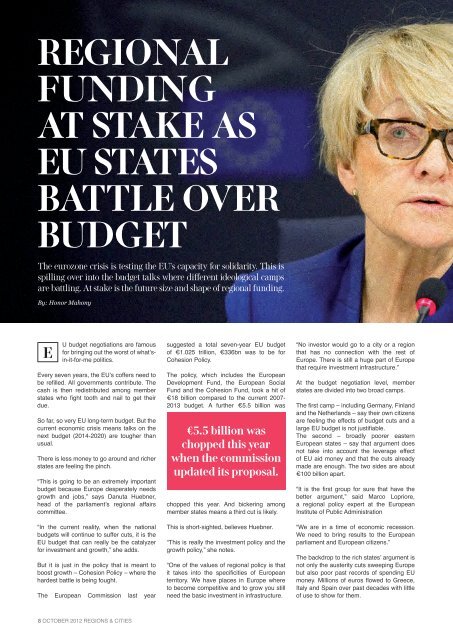Regions & Cities 2012: Economic Crisis & Austerity
The 2012 edition of EUobserver's Regions & Cities magazine looks at the impact of the economic crisis on Europe.
The 2012 edition of EUobserver's Regions & Cities magazine looks at the impact of the economic crisis on Europe.
You also want an ePaper? Increase the reach of your titles
YUMPU automatically turns print PDFs into web optimized ePapers that Google loves.
REGIONAl<br />
FUNDING<br />
at stake AS<br />
EU statES<br />
battle ovER<br />
bUDGEt<br />
The eurozone crisis is testing the EU’s capacity for solidarity. This is<br />
spilling over into the budget talks where different ideological camps<br />
are battling. At stake is the future size and shape of regional funding.<br />
By: Honor Mahony<br />
E<br />
U budget negotiations are famous<br />
for bringing out the worst of what’sin-it-for-me<br />
politics.<br />
Every seven years, the EU’s coffers need to<br />
be refilled. All governments contribute. The<br />
cash is then redistributed among member<br />
states who fight tooth and nail to get their<br />
due.<br />
So far, so very EU long-term budget. But the<br />
current economic crisis means talks on the<br />
next budget (2014-2020) are tougher than<br />
usual.<br />
There is less money to go around and richer<br />
states are feeling the pinch.<br />
“This is going to be an extremely important<br />
budget because Europe desperately needs<br />
growth and jobs,” says Danuta Huebner,<br />
head of the parliament’s regional affairs<br />
committee.<br />
“In the current reality, when the national<br />
budgets will continue to suffer cuts, it is the<br />
EU budget that can really be the catalyzer<br />
for investment and growth,” she adds.<br />
But it is just in the policy that is meant to<br />
boost growth – Cohesion Policy – where the<br />
hardest battle is being fought.<br />
The European Commission last year<br />
suggested a total seven-year EU budget<br />
of €1.025 trillion, €336bn was to be for<br />
Cohesion Policy.<br />
The policy, which includes the European<br />
Development Fund, the European Social<br />
Fund and the Cohesion Fund, took a hit of<br />
€18 billion compared to the current 2007-<br />
2013 budget. A further €5.5 billion was<br />
€5.5 billion was<br />
chopped this year<br />
when the commission<br />
updated its proposal.<br />
chopped this year. And bickering among<br />
member states means a third cut is likely.<br />
This is short-sighted, believes Huebner.<br />
“This is really the investment policy and the<br />
growth policy,” she notes.<br />
“One of the values of regional policy is that<br />
it takes into the specificities of European<br />
territory. We have places in Europe where<br />
to become competitive and to grow you still<br />
need the basic investment in infrastructure.<br />
“No investor would go to a city or a region<br />
that has no connection with the rest of<br />
Europe. There is still a huge part of Europe<br />
that require investment infrastructure.”<br />
At the budget negotiation level, member<br />
states are divided into two broad camps.<br />
The first camp – including Germany, Finland<br />
and the Netherlands – say their own citizens<br />
are feeling the effects of budget cuts and a<br />
large EU budget is not justifiable.<br />
The second – broadly poorer eastern<br />
European states – say that argument does<br />
not take into account the leverage effect<br />
of EU aid money and that the cuts already<br />
made are enough. The two sides are about<br />
€100 billion apart.<br />
“It is the first group for sure that have the<br />
better argument,” said Marco Lopriore,<br />
a regional policy expert at the European<br />
Institute of Public Administration<br />
“We are in a time of economic recession.<br />
We need to bring results to the European<br />
parliament and European citizens.”<br />
The backdrop to the rich states’ argument is<br />
not only the austerity cuts sweeping Europe<br />
but also poor past records of spending EU<br />
money. Millions of euros flowed to Greece,<br />
Italy and Spain over past decades with little<br />
of use to show for them.<br />
8 OCTOBER <strong>2012</strong> REGIONS & CITIES

















